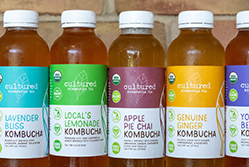CULTURED KOMBUCHA: Automation Boosts Production & Expands Reach
MMTC provided a unique opportunity to view our production process through an unbiased lens for continued improvement. We're excited for the opportunity to continue our journey into automation.
-- Courtney Lorenz, Founder
Cultured Ferments Co. was founded in Northern Michigan in 2015 as the first microbrewery of kombucha – an effervescent fermented drink of sweetened tea created by live cultures of bacteria and yeast. The Traverse City-headquartered company, which does business as Cultured Kombucha Co. (drinkcultured.com), is now the largest manufacturer in the Midwest and the only certified organic operation in Michigan (as of 2023). Cultured Kombucha products are available at more than 400 retailers throughout the Midwest. Cultured Kombucha Co. was founded by Courtney Lorenz, who has received multiple recognitions as a business leader, and employs five.
Challenge
Cultured Kombucha manufactures a line of kombucha tea through a traditional fermentation process. The product requires approximately 14 to 21 days of fermentation prior to packaging for retail distribution. The bottling process required a person to manually handle individual bottles for filling, capping, and labeling. This was the “bottleneck” of the entire production process and was limiting retail growth and product distribution.
Solution

To address the bottleneck issue, Michigan Manufacturing Technology Center (MMTC) was contacted. MMTC staff conducted an Industry 4.0 Readiness Assessment to help identify opportunities to reduce costs and increase product volume. The assessment confirmed the bottling line and the finished product transfer process from the fermentation tanks, mixing tanks and fill line, would benefit from technology implementation. The report recommendations supported the company’s application to receive an equipment grant from the Michigan Economic Development Corporation to match the company’s investment in a used automated bottle cleaning and fill line. The machine acquired has the capability to clean and automatically fill eight bottles at one time, thereby reducing the staff time needed to manually clean and individually fill bottles. The result is less time and reducing repetitive hand and arm motion for each bottle. A company employee is also learning to maintain and adjust the equipment as needed, thereby replacing repetitive manual work with higher value, knowledge-based work.
Results
- Expanded retail presence by 25%
- Changeover time savings of 33%
- Volume capacity increased 75%
- Reduced scrap, material, and product loss by 20%
- Improved product quality/consistency
- Improved safety by reducing repetitive hand and arm motion
- Developed two staff member’s capabilities to maintain and adjust the automated equipment